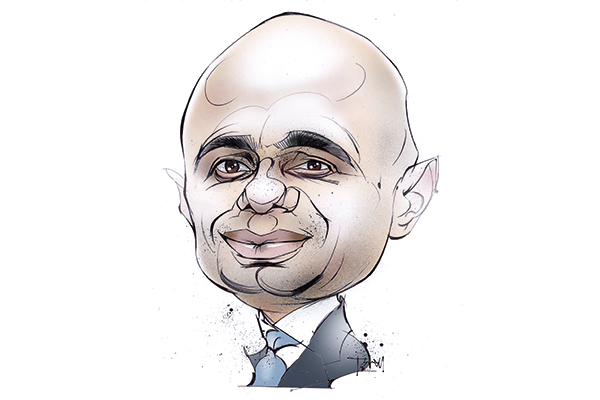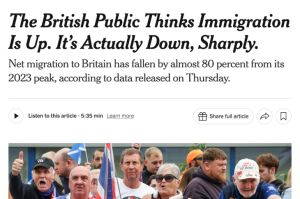If Boris Johnson wins next week, it will be on a manifesto of change. He will not deliver the fourth term of the same Tory government, he says, but a new agenda guided by a new philosophy — and the big difference will be spending. Gone are the days when Tories defined themselves by a determination to balance the books. Sajid Javid, the chancellor, promises a ‘new economic plan for a new era’, which would mean investment on a scale that would have made George Osborne baulk. Providing, of course, that his party is still in government by the end of the next week.
‘There is a path to victory,’ he says when we meet while he is campaigning on the outskirts of Birmingham. ‘But it’s a narrow path. I can’t help but think of what happened in 2017 when most polls indicated the Conservatives were ahead. And look what happened.’ But last time, he says, the Tories were complacent. ‘We’re going to be out there fighting for every single vote.’ And they have a new message: the austerity era is over, and a new plan of spending will begin. Yes, funded by debt. But this time, it will be different.
Sajid Javid’s life story is, by now, pretty well-known. The son of an immigrant bus driver, he scraped into sixth-form college then, after Exeter University, had a successful career as a banker. His time in finance persuaded him that there has been a big shift in global debt markets — one that he says will keep interest rates at rock-bottom for 10 years or more.
So any investment likely to boost economic growth by a half-decent amount will be worthwhile, because the cost of borrowing is next to nothing. This is his ‘new era’. ‘Look at the demographic change going on across the world: people living longer, baby boomers getting older, retiring with a lot of assets compared to the previous generation,’ he says. ‘Investors are saying to government, in effect: “I’ve got loads of money for you that I want you to invest. And I don’t mind if you return me less than I’ve given you because that’s still a good return for me compared to everything else.”’
He says that if the interest rate charged is less than the rate of inflation this is — in real terms — a negative interest rate (or, in the jargon of government borrowing, ‘yield’). So the government is, in effect, being paid to borrow. ‘The Treasury didn’t even have models that could compute negative yields because they’d never thought this would happen,’ he says. ‘It just shows you how they weren’t set up for this. And I would be constantly challenging, saying: “Well, hold on. This is not right, I can knock up a spreadsheet in five minutes and work out a lot of it for myself!” But now I have the privilege of being in charge of the Treasury, we’ve already started making changes to models. To allow for what is, I think, a unique situation in terms of government investment.’
He now plans £100 billion ($130 billion) of spending over five years, on projects most likely to generate returns: he sees this as a basic business calculation. Universities, further education colleges, roads, railways: if it’s likely to develop a real-terms (i.e. above inflation) return to the taxpayer then it can go in the shopping basket. ‘We’ve already said that we will invest in the Manchester to Leeds connection. What we’re missing in infrastructure transport connections in our country is that everything’s well connected to London, but not cross-country.’ Then, telecoms. ‘Fibre-optic investment is another good example, with the 20 percent roughly that the market won’t do, because it’s uneconomic for the market itself. We can invest a lot more quickly early on in connecting that 20 percent.’
I put to him that this sounds an awful lot like Labour’s plan: government steps in to correct market failures, on broadband and more, and that with interest rates so low it would be rude not to borrow. ‘The difference is that Jeremy Corbyn is led by ideology. I’m led by laws of economics and what works. Labour has set out huge spending plans: some of this is infrastructure, but a lot isn’t. They make no distinction in what they’re borrowing, whether it’s for day-to-day spending or for infrastructure spending.’ The other difference, he says, is rules: his splurge would be abandoned if interest rates spike, and debt would never rise faster than economic growth. ‘[In] Labour’s plans, by their own admission, borrowing will be on a very steep upward trajectory. Uncontrolled.’
This, of course, raises an interesting question: was that austerity really necessary? George Osborne’s argument, 10 years ago, was that the country simply had to get back in the black because the cost of borrowing would only be low for a short period. That interest rates would bounce back up, and any country that did not have a deficit under control could be crushed. But he was wrong. The rates stayed low, and after a while economists began to suspect that this was not a freak.
‘That’s what pretty much every economist and market player thought. But clearly, not only was that not the case, but yields kept falling,’ Javid says. ‘It was about — for me — about four or five years ago that I thought that this is something that will be around for long. What I call “low for long”.’ How long? ‘At least a decade or so,’ he says. ‘Look at Japan, the US, the eurozone — engaging in lots more quantitative easing. So for a variety of factors, I think rates are going to remain low for long. I have thought — long before becoming chancellor — that this means something. It’s a signal to the government that there is more that you can do to invest in the economy. I mean properly invest in economic infrastructure.’
Failure to do so, he says, he been holding the country back. ‘When you look at Britain itself compared to other G7 countries, we have relatively low productivity. Part of that is because of our lack of investment over successive governments in infrastructure.’ But if it’s such a no-brainer, why aren’t more countries adopting this borrow-and-spend approach? ‘If you look at Germany, for example, their stated public policy is that they won’t do this. And they have yields as low as ours, if not lower. But Japan for example has, compared to other countries, taken advantage of this occurrence. So it is something we could have done a few years ago. For whatever reason, we didn’t. But now we can look forward to doing this. And it will be transformative.’
It’s true that Javid has been making this case for years now. His first stab at party leadership, as the junior partner to the now-forgotten Stephen Crabb in 2016, involved a manifesto of borrowing and investing £100 billion over five years. As housing minister, he drafted plans for massive borrowing to finance home construction, but this was quashed by Theresa May. ‘To me, it just felt quite ludicrous seeing that a government could borrow at negative real interest rates and not take advantage of that.’
But Boris Johnson, he says, is fully on board with the big spending agenda. ‘We have a prime minister that absolutely believes in all this, who has long thought himself that we need to invest more in infrastructure in our country. To level up. When Boris and I first started discussing this, we were absolutely at one. I felt this would be a great partnership.’ It’s rumored that No. 10 wanted to borrow even more to finance tax cuts but this was vetoed by Isaac Levido, the campaign chief, who said it was crucial to retain a financial dividing line with Labour. As things stand, for every extra pound the Tories would spend on public services, Labour would spend £28 ($37).
Relations between the prime minister and the chancellor are helped by the fact that both live in their Downing Street flats and share a garden. ‘Our dogs, Bailey and Dilyn, are friendly,’ he says. ‘We’re quite frequently in the garden both at weekends and during the week. Living in the same building has been great, for both me and the prime minister. Whenever we want to catch up, whether it’s social or otherwise, it’s very easily done. But I think it’s good for the government as well, when you have a chancellor and Prime minister that work so closely together.’
Javid is the only member of the cabinet who the prime minister has promised to keep in place if he wins next week. Both are keen to assure Remainers that Brexit will not mean a Little England. For example, Javid says foreign students have already been granted an automatic visa for two years. ‘I wanted to do this as home secretary, but couldn’t. Under Boris Johnson, it was something he’s long wanted too.’ And he’d like to go further now. ‘If you’re a graduate of one of the top 50 universities in the world, why shouldn’t you be allowed to come and work automatically in the UK?’ It would be a reboot of the ‘global Britain’ message that Johnson had as foreign secretary. ‘Anyone who thinks that Brexit was a vote to become a more inward-looking country — closing ourselves off — will be very disappointed.’
Javid’s agenda is unusual for a Tory: spending galore and plans to raise the living wage to £10.50 ($14), one of the highest rates in the world. The British government would be controlling the wages of one in six British workers. It’s Toryism, says Javid, but of a new kind. ‘The living wage speaks to our values. We’ve always been a party that’s on the side of working people,’ he says. ‘I think it’s right that you don’t have anyone working full-time for private companies where they are subsidized by the state. I don’t think that is right.’
The generous tax cuts that Johnson promised in his leadership campaign are now downgraded to National Insurance cuts: the more serious tax cuts will happen once the budget allows. ‘Whenever we can cut tax and give people back more of their hard-earned cash, we will do that,’ Javid says. That’s if the Tories win next week — which, as he admits, is still a very big ‘if’.
This article was originally published in The Spectator’s UK magazine. Subscribe to the US edition here.


























